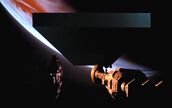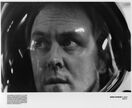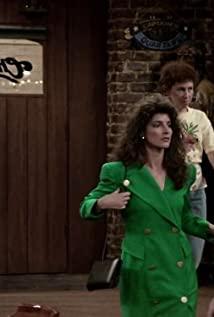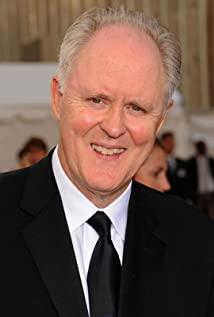When I finished watching the previous work "2001: A Space Odyssey", I called Hal Hell immorally to express my hatred for his unscrupulous act of murder and arson (actually, he didn't set the fire, but only killed four people). Whenever I saw Hal's red eyes (even if they were eyes) gazing forward calmly, I wondered if the kid was going to do something. (But in fact, it seems that the appearance of this lens is indeed foreshadowing things.) However, Kubrick did not shoot the whole picture. The seemingly evil red-eyed Hal actually became almost demented because of contradictory computer instructions.
When Chandra set basic instructions to Hal, he was strictly forbidden to conceal the truth. However, the American Discovery went to the Jupiter area to find the black stele which was classified and required him to hide it. This is the first contradiction. At the same time, Hal also has an extremely advanced function. When a person is dead, he can complete the task independently. So David Bowman was there to check and chase him down, and Hal felt terrified because the mission could not be completed. This is the second place. The two evils are the lesser one, and Hal kills four people. (Americans shouldn’t be so stupid that they didn’t follow the instructions of artificial intelligence before they acted)
Our Hal is actually very kind.
The protagonist of the tear point is mostly Hal. When he was dying, (actually not dead) lonely timing, twenty seconds, at that time Chandra had already returned to the Soviet spacecraft, he was there alone, and it almost burst my tears. He told Chandra, I am afraid, just to take care of his plea for David in the previous work. One more sentence Thank you for telling me the truth, he knows he is going to be destroyed, he is still so gentle, Hal begs you not to burst into tears...
At this time, Hal is a life worthy of being respected. This is another philosophical proposition. Hal has no body, but has the same spirit and thinking as human beings. So is it considered a high-level intelligent life? I think it counts, because spiritual form is also a direction of civilization development (think of the second base). Hal is almost a silicon-based life, because he has the ability to think independently and has a device that can barely be called a body. Carbon-based is the normal state of life in our lives, but the universe is vast, who knows how many forms of life there will be? So what reason do we have to question whether Hal is a life?
In the end, David appeared to comfort Hal. I guess the two of them might have become a high-level spiritual life together. In fact, you can make up a story. The robot is attached to the doctor who made its own, but the captain of the spacecraft he served has a crush on him for a long time... In order to execute the doctor's order, the robot will not hesitate to kill the captain's teammates. The captain killed the robot angrily, but couldn't resist the surging love in his heart, and rescued the robot from now on flying in the universe...
Hal is really cute.
View more about 2010: The Year We Make Contact reviews











